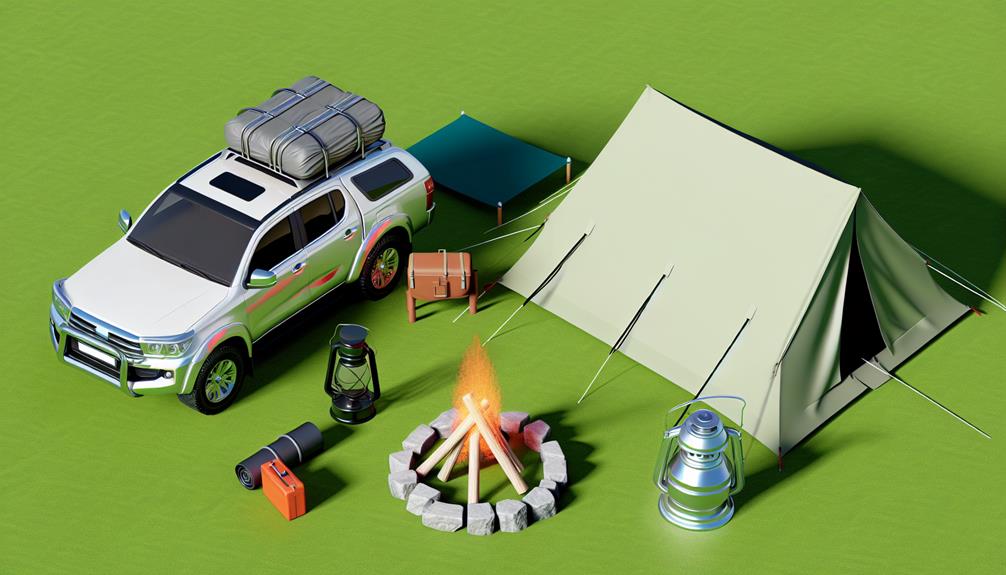When deciding between car camping and tent camping, safety is a crucial factor to consider. Both options have their own set of risks and benefits that campers need to weigh. The level of safety can vary significantly depending on the chosen camping method, from protection against wildlife encounters to safety in extreme weather conditions.
By examining the advantages and potential hazards of each camping style, a clearer picture emerges on which option offers a safer outdoor experience. The decision between car camping and tent camping goes beyond just convenience; it is about ensuring a secure and enjoyable camping trip.
Key Takeaways
- Car camping provides a physical barrier against wildlife and extreme weather, enhancing safety.
- Quicker access to emergency response services is available in car camping scenarios.
- Locked doors and windows in vehicles offer security features not present in tent camping.
- Immediate shelter and access to safety supplies make car camping a safer option in emergencies.
Safety Considerations for Car Camping Vs Tent Camping
When comparing safety considerations between car camping and tent camping, it is essential to analyze various factors that contribute to the overall security and well-being of campers in both scenarios. Emergency preparedness plays a crucial role in ensuring camper safety, with car camping offering the advantage of having a vehicle nearby for shelter and transportation in case of emergencies. The location of the campsite also plays a significant role, as accessibility to help and proximity to potential risks can vary between car camping sites and remote tent camping locations.
Wildlife encounters are another critical aspect to consider when evaluating safety in camping. While both car camping and tent camping can expose campers to wildlife, the level of security differs. Car camping provides a more secure barrier against wildlife due to the enclosed vehicle, offering protection from potential encounters. In contrast, tent camping requires campers to rely on the strength of their camping gear and precautions taken to secure their campsite from wildlife intrusions.
Risk Factors to Evaluate in Camping Options
Considering the safety implications discussed between car camping and tent camping, an essential aspect to evaluate in determining the most prudent camping option is the thorough analysis of risk factors inherent to each choice. Two primary categories of risk factors to consider are wildlife encounters and weather conditions, as well as remote locations and emergency response.
| Risk Factors | Description |
|---|---|
| Wildlife encounters | Both car camping and tent camping expose individuals to potential encounters with wildlife. While car camping provides a more solid barrier, tent camping may leave campers more vulnerable. |
| Weather conditions | Both camping options are susceptible to changing weather conditions. Tents offer less protection from extreme weather, whereas being inside a car can provide more security. |
| Remote locations | Tent camping often occurs in more remote locations, increasing the distance to emergency services. Car camping, on the other hand, can sometimes be done near facilities or roads, improving access to help. |
| Emergency response | In case of emergencies, the response time may vary between car camping and tent camping due to factors like communication availability and access to transportation. |
Advantages of Safety Features in Car Camping
Car camping offers inherent safety advantages through the utilization of built-in protective features within the vehicle. One of the main security benefits of car camping is the physical barrier the vehicle provides between campers and potential dangers, such as wildlife or unfriendly strangers.
The locked doors and windows of a car can act as a deterrent, enhancing the sense of security for campers. In addition, the proximity of the vehicle allows for quick access to safety supplies or a means of escape in emergency situations. For example, if there is inclement weather or a sudden threat, campers can easily retreat to the safety of their vehicle.
This immediate access to shelter and resources can make a significant difference in ensuring the well-being of campers. Overall, the safety features inherent in car camping contribute to a more secure and protected camping experience compared to tent camping scenarios.
Potential Hazards in Tent Camping Scenarios
Tent camping scenarios present various potential hazards that campers should be aware of to ensure their safety and well-being during outdoor adventures. One significant risk in tent camping is wildlife encounters. Campers may come into contact with wild animals like bears, snakes, or insects, which can pose a threat if proper precautions are not taken. It is crucial for campers to store food securely, dispose of waste properly, and be knowledgeable about the wildlife in the area to minimize the chances of dangerous encounters.
Additionally, weather conditions can also present hazards in tent camping scenarios. Sudden changes in weather, such as thunderstorms, high winds, or extreme temperatures, can put campers at risk if they are not adequately prepared. Campers should check weather forecasts before their trip, pack appropriate clothing and gear, and have a plan in place in case of severe weather conditions.
Comparing Overall Safety Levels: Car Vs Tent Camping
When evaluating the overall safety levels of different camping options, it is essential to consider various factors that can impact the well-being of campers. Car camping tends to offer a higher level of safety compared to tent camping in several aspects.
Firstly, in terms of environmental impact, car campers are shielded from extreme weather conditions and environmental hazards to a greater extent due to the sturdy structure of the car. This can be crucial in ensuring the safety and well-being of campers during unforeseen circumstances. Additionally, car camping allows for quicker access to emergency response services in case of any incidents, enhancing overall safety levels.
Moreover, when considering wildlife encounters, car campers are generally at a lower risk than tent campers as the car provides a barrier between them and potential wildlife threats. Furthermore, theft prevention is often more manageable in car camping setups where valuables can be stored securely within the vehicle. These factors collectively contribute to a perception of increased safety in car camping scenarios compared to tent camping.
Frequently Asked Questions
Can Bears or Other Wildlife Pose a Greater Safety Risk in Tent Camping Compared to Car Camping?
Wildlife encounters can pose a greater safety risk in tent camping due to closer proximity. Implementing bear safety protocols, such as proper food storage and site selection, is crucial. Car camping may offer more protection from wildlife, but safety measures are essential in all camping locations.
Are There Specific Safety Precautions to Take When Camping in Areas With Extreme Weather Conditions?
When camping in areas prone to extreme weather conditions, it is vital to prioritize safety. Prepare by checking weather forecasts, packing appropriate gear, and knowing terrain navigation and survival skills. These precautions can help ensure a safe outdoor experience.
How Can Campers Ensure Their Personal Belongings Are Secure in Both Car and Tent Camping Situations?
When camping, campers can ensure personal belongings' security by utilizing locking mechanisms for both car and tent camping. Storage solutions like lockable containers or bags can enhance personal security. Campsite strategies include keeping valuables out of sight and securing items when not present.
Are There Differences in Emergency Response Times for Car Campers Versus Tent Campers in Remote Locations?
Emergency response times for campers in remote locations vary based on accessibility and communication. Safety precautions such as carrying emergency devices and signaling tools are critical. Both car and tent campers must be prepared for potential delays in receiving assistance.
What Are the Risks of Encountering Dangerous Insects or Plants While Camping in a Tent Versus a Car?
When camping, it's important to consider the risks of encountering dangerous insects or plants. Bring insect repellent and take precautions. Learn to identify poisonous plants. Being informed and prepared can help mitigate these risks in both tent and car camping scenarios.
Conclusion
In conclusion, after analyzing the safety considerations and risk factors associated with car camping and tent camping, it is evident that car camping generally offers a higher level of safety due to its advantages in security features and protection from potential hazards.
Although tent camping can provide a more authentic outdoor experience, the convenience and safety features of car camping make it a safer option overall.
Ultimately, choosing between car camping and tent camping depends on individual preferences and comfort levels.

